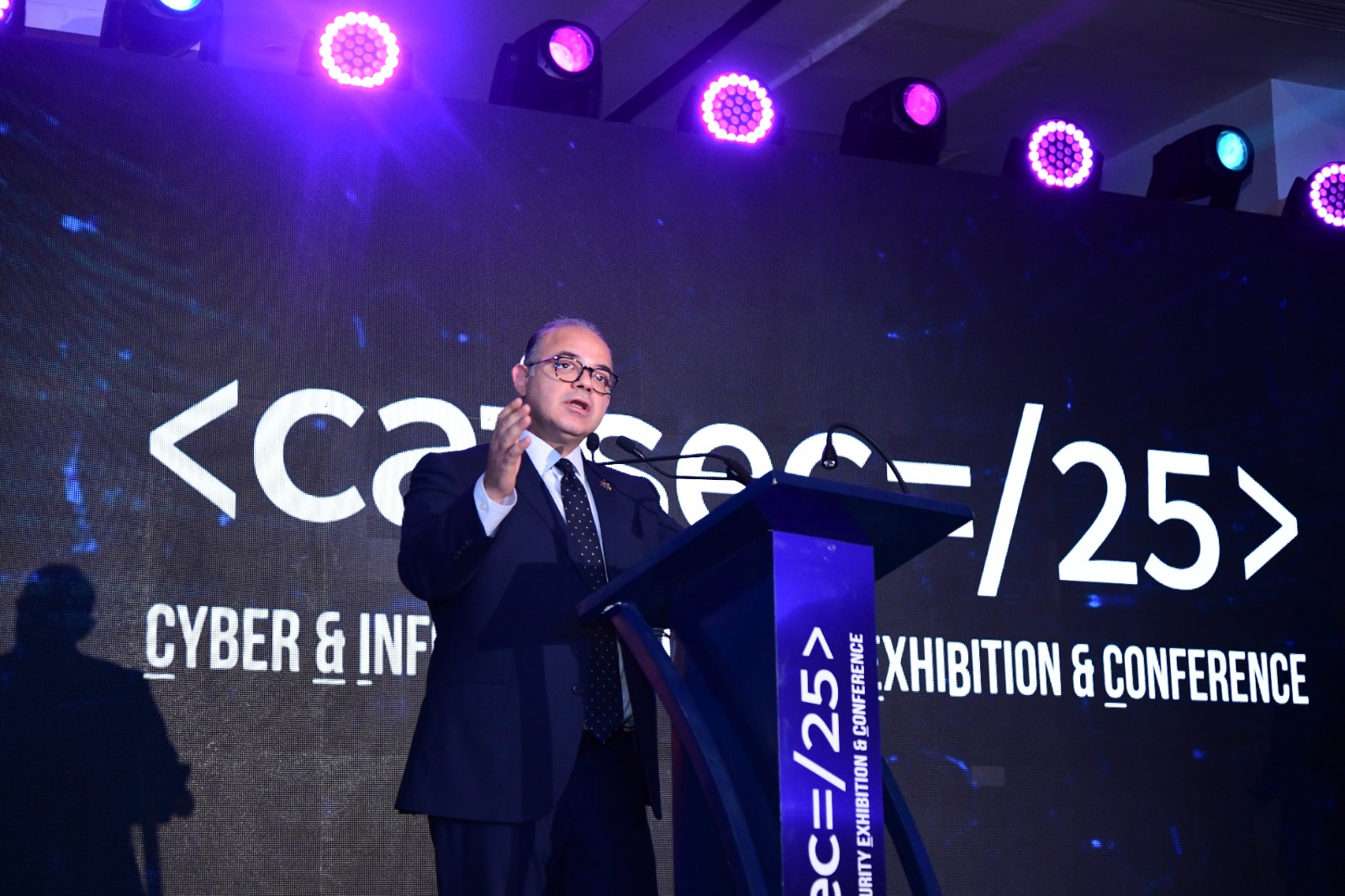- The conference featured a notable governmental presence, bringing together ministers from key sectors such as Health, Finance, Communications, Higher Education, Supply and Education.
Dr. Mohamed Farid – FRA Chairman :
- Cyberattacks and data breaches represent the new battlefield, necessitating preparation as a fundamental requirement for achieving financial stability.
- We prioritize cybersecurity by developing robust policies and systems to safeguard customer data, crucial for market stability.
- Our goal is to foster a work environment that ensures data security and market stability for all operating entities, thereby strengthening the sector’s contribution to the national economy.
- While Egypt’s rapid digital transformation brings new opportunities, it also escalates cybersecurity challenges and threats.
- Technological advancements must be matched by enhancing human expertise to effectively close the information gap.
- Sixteen companies have already secured FinTech licenses from the Authority, spearheading digital transformation within the non-bank financial sector.
- The Authority currently has four registered outsourcing service providers, with more companies anticipated to enter this market in the near future.
Dr. Mohamed Farid, FRA Chairman delivered a keynote speech at the fourth edition of Caisec25. This prominent event, a key forum for electronic security innovations in the Middle East and Africa, provided a platform for Dr. Farid to detail FRA’s ongoing commitment to foster a secure and stable environment that bolsters the non-bank financial sector’s contribution to the national economy. These efforts are central to FRA’s continuous drive to implement policies and measures that safeguard customer data and ensure market stability.
The two-day conference’s main sessions featured a distinguished lineup of government officials, including Dr. Khaled Abdel Ghaffar, Deputy Prime Minister and Minister of Health; Dr. Amr Talaat, Minister of Communications and Information Technology; Ahmed Kouchouk, Minister of Finance. In addition to Dr. Ayman Ashour, Minister of Higher Education and Scientific Research; Mohamed Abdel Latif, Minister of Education and Technical Education and Dr. Sherif Farouk, Minister of Supply and Internal Trade.
In his address, FRA Chairman underscored the Authority’s unwavering focus on cybersecurity as the regulator of the non-bank financial sector which encompasses the capital market, insurance and other non-bank financing activities. He emphasized that developing robust policies and systems to protect customer data is paramount for market stability, a fundamental responsibility of any financial sector regulator. He stressed that FRA is actively working to establish a secure data environment and stable markets for non-bank financial institutions, thereby fortifying the sector’s economic role.
Dr. Farid further articulated that FRA’s regulatory framework explicitly acknowledges cyberattacks and database breaches as the new battlefield. He therefore stressed the critical need for heightened cybersecurity measures. Egypt’s accelerating digital transformation across every sector amplifies this urgency, offering new opportunities, but concurrently fostering an increasing number of cybersecurity threats.
He explained that this situation demands prompt action to develop policies and operating systems that strengthen FinTech governance. This ensures non-bank financial institutions can effectively use these technologies, ultimately boosting market stability.
FRA Chairman also spoke about the rapid and revolutionary pace of artificial intelligence (AI) development. He stressed the vital need to strengthen the recovery capabilities of institutions and markets, recognizing that technological progress inherently introduces new risks. Therefore, a heightened state of preparedness is crucial to cultivate a flexible non-bank financial sector that can both harness technological advancements and manage associated risks with greater efficiency and effectiveness.
Dr. Farid underscored that technological progress must be accompanied by enhanced human capital efficiency to achieve ambitious goals and narrow existing knowledge gaps. He highlighted the indispensable role of human capital in business models. Accordingly, specialists in electronic security and cybersecurity innovation should prioritize the provision of comprehensive, varied and sustained training programs for human resources.
FRA Chairman affirmed that such training has become indispensable, largely due to the recent accelerated digitization of non-bank financial transactions. This surge was directly spurred by FRA’s issuance of various decrees implementing Law No. 5 of 2022, which provides the essential regulatory and legislative framework for integrating and fostering technology use in non-bank financial activities and services.
FRA has proactively established a robust FinTech framework. This began with Decree No. 139 of 2023, outlining the essential technological infrastructure, information systems and security measures for integrating FinTech into non-banking financial activities. Following this, Decree No. 140 of 2023 addresses critical areas such as digital identity, digital contracts, and digital registries, alongside compliance requirements. Significantly, it marks the first comprehensive regulatory decree from financial sector regulators to detail the electronic Know Your Customer (e-KYC) process for digital onboarding.
Further solidifying this comprehensive framework, Decree No. 141 of 2023 established an outsourcing registry specifically for FinTech within non-bank financial activities. This registry lists authorized companies that provide vital electronic services, including customer identification and contract recording to financial firms operating in this specialized domain.
These initiatives have already shown substantial progress: sixteen institutions and entities have successfully obtained diverse FinTech licenses from the Authority, actively spearheading digital transformation. Furthermore, around 110 institutions and entities adhere to the Authority’s cybersecurity requirements. Despite these achievements, FRA’s regulatory journey continues, as it regulates more than 3,500 companies and institutions across various financial activities and markets.
Dr. Farid further highlighted that four companies currently offer outsourcing services, with significant potential for this number to increase substantially. These registered firms play a crucial role in the digital landscape, handling electronic identification, verification, and authentication, facilitating electronic customer identification, enabling the digital execution of non-bank financial product contracts, and managing electronic registration, storage and retrieval from digital registries.
Last modified: May 27, 2025
